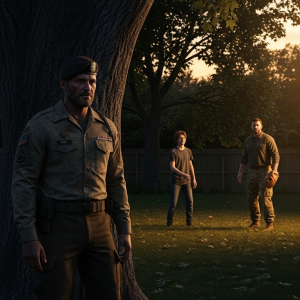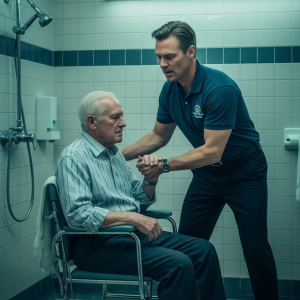The air in the penthouse apartment was thick with the scent of expensive whiskey and premature victory. Richard Sterling, eldest son and heir apparent, raised his glass. His younger brother, Thomas, mirrored the gesture, a predatory smile gracing his lips. Below them, the city glittered, a concrete and glass kingdom they were about to inherit.
“To Dad,” Richard said, the words dripping with insincere reverence. “He was a brilliant old dinosaur. Built an empire with his bare hands. A bit too sentimental for his own good, but now… the sentiment is over.”
“Here, here,” Thomas chimed in, already scrolling through market reports on his phone. “First order of business is to liquidate the legacy divisions. All that nonsense about employee pensions and community outreach. They’re dead weight. He was stuck in the past. We can triple our profit margins in six months if we’re ruthless.”
Their father, Edward Sterling, had been a titan, a man who built a global manufacturing conglomerate from a single workshop. But in his later years, he had become, in his sons’ eyes, soft. He poured millions into an anonymous charitable foundation, a pursuit they considered a colossal waste of time and capital. They saw the company as a machine for generating wealth; he saw it as a legacy that owed a debt to the world.
A quiet cough from the doorway announced their sister. Clara stood there, a shadow in the brilliant light of the penthouse. She was dressed in a simple, dark dress, her face etched with genuine grief. She had been the one by their father’s bedside for the past six months, reading to him, talking with him, while her brothers were busy calculating their inheritance.
“The lawyer’s car is downstairs,” she said, her voice barely a whisper.
Richard didn’t even turn to look at her. “Try to look presentable, Clara. Let’s not broadcast our family’s charity case to the world on a day like today.” He still resented the small, independent bookstore she ran, a venture their father had quietly helped her fund. To him, it was a symbol of her failure to be ambitious, to be a Sterling.
Clara flinched but said nothing. She had long grown accustomed to her brothers’ casual cruelty. She was the only one who had truly listened to her father’s stories, who understood his philosophy. She remembered him, just weeks before he passed, tapping the old fountain pen he always carried in his breast pocket. “Don’t worry about the future, my girl,” he had told her, his voice weak but his eyes sharp. “You have a golden character, and that is an asset no one can take from you.” She thought it was just a father’s comforting words. She had no idea it was a promise.
The law offices of Harding, Shaw & Gable were a bastion of old-world power, all polished mahogany and the scent of aged paper. The Sterling siblings sat before Mr. Harding, a man who had been their father’s confidant for half a century. Richard and Thomas could barely contain their smug anticipation. Clara just wanted it to be over.
Mr. Harding cleared his throat and began to read from the will. The language was dense and formal, but the intent was clear. Richard was named the new Chief Executive Officer of Sterling Industries. Thomas was appointed Chief Operating Officer. They were also bequeathed a significant, but not controlling, number of company shares. Their smiles were triumphant.
The lawyer droned on, listing minor bequests to distant relatives and loyal staff. Finally, he came to the last item. He paused, looking over his spectacles at Clara, a flicker of something unreadable in his eyes.
“…and to my youngest, my dearest daughter, Clara,” he read, his voice softening slightly, “I leave the one object that truly built my life and this company. The one thing that holds the power of creation and decision. I leave her my Montblanc fountain pen.”
A beat of stunned silence, and then, it came. A loud, barking laugh from Richard, quickly followed by a snickering chuckle from Thomas. The sound echoed in the quiet, dignified office.
“A pen!” Richard exclaimed, wiping a tear of mirth from his eye. “Father always did have a keen sense of a person’s worth. That’s priceless!”
Thomas leaned towards his sister, his voice dripping with condescending pity. “Don’t lose it, Clara. You might need it to sign your unemployment checks after we sell off Dad’s pet project bookstore.” He winked at Richard. “Or maybe you can write a very strongly worded letter to the welfare office.”
Clara felt a hot flush of humiliation creep up her neck. She felt the weight of every condescending remark, every dismissive glance, every time they had made her feel small and insignificant. This was their final, ultimate act of derision, a joke from beyond the grave, co-signed by the father she had adored.
She accepted the pen from a stone-faced Mr. Harding, its cool, heavy weight a comfort and an insult in her hand. She didn’t say a word as she walked out, the sound of her brothers’ triumphant, back-slapping laughter following her down the long, silent hallway.
Clara’s apartment was a small, cozy haven, a world away from the cold, cavernous spaces her brothers inhabited. It was filled with books, the scent of tea, and the quiet dignity of a life lived on its own terms. That evening, she sat by her window, the city lights a distant, indifferent glitter, the pen resting on the table before her.
It was a beautiful object. Black resin, gold trim, a symbol of a bygone era of elegance and power. Her father had always carried it. “This pen built our empire, Clara,” he used to say. “A single signature from this nib can change the world.” She had thought he was being metaphorical.
Lost in grief and memory, she fiddled with the pen, her fingers tracing its smooth contours. She twisted the cap, then the body. As she twisted the gold ring at the base of the pen, something she’d never done before, she heard a faint click. A tiny seam appeared. Her heart skipped a beat. She twisted it further, and the bottom section of the pen came away, revealing not an ink cartridge, but a tiny, hidden compartment.
Inside, nestled in a sliver of foam, was a micro SD card.
Her hands trembled as she found an adapter and slid the card into her laptop. A single video file appeared on the screen. She clicked it.
Her father’s face filled the screen. He looked older, more tired than she remembered, but his eyes were filled with a familiar, loving fire. He was in his study, the pen held gently in his hands.
“My dearest Clara,” he began, his voice a beloved, ghostly echo. “If you are watching this, then I am gone, and your brothers have just had a good laugh at your expense. For that, I am truly sorry. But it was a necessary cruelty, my girl. A final test.”
He leaned closer to the camera. “Your brothers are smart, but they are not wise. They see the world in spreadsheets and stock prices. You, my child, see it in people. In integrity. In legacy. That is why I am not leaving you a fortune. I am leaving you a responsibility.”
He held the pen up. “This is not a memento. It is a key. Years ago, I established an anonymous foundation, The North Star Charitable Trust. I have spent two decades secretly transferring the majority of my personal shares in Sterling Industries into that trust. The North Star Trust, Clara, is now the majority shareholder. It owns 51% of the company.”
Clara gasped, her hand flying to her mouth.
“Your brothers believe they are in control,” her father continued, a wry smile on his lips. “But they are merely minority shareholders with fancy titles. The true power lies with the Trust. And the Trust is governed by a board, whose charter I alone could amend. That contract you saw me sign with Mr. Harding last month, the one I signed with this very pen? It was the final, binding amendment to that charter.”
He looked directly into the camera, his eyes seeming to pierce through time and space to find hers. “It names you, Clara Sterling, as the new, permanent, and lifetime Chair of the Board of the North Star Trust. You have full and total authority over its voting shares. You, my dear, quiet, underestimated daughter… you are now the boss.”
“Mr. Harding has all the paperwork,” he concluded. “He knows what to do. The board meeting is tomorrow at ten. Go, my child. And show them what a Sterling truly is.”
The Sterling Industries boardroom was a theater of corporate warfare. A long, black table sat under recessed lighting, surrounded by portraits of stern-faced executives. Richard, in the chairman’s seat, presided with the smug arrogance of a newly crowned king. Thomas stood before a large screen, presenting a brutal, efficient strategy.
“As you can see,” Thomas said, pointing to a slide titled ‘Project Streamline,’ “by divesting from the non-essential legacy divisions—specifically, the domestic manufacturing plants in Ohio and Michigan—and outsourcing production, we can increase our profit margin by 35% within two fiscal years. The short-term severance costs are negligible compared to the long-term gains.”
A few of the older board members, loyalists from Edward’s era, looked uneasy. “Richard, those plants are the lifeblood of two towns,” one of them ventured. “Your father always said…”
“My father was a sentimentalist,” Richard cut in, his voice cold as steel. “And sentiment has no place in a modern portfolio. We’re here to make money for our shareholders, not to run a charity. All in favor of moving forward with Project Streamline?”
He raised his hand. Thomas quickly followed. A few others, the new guard Richard and Thomas had installed, did the same. It was a clear majority of those present.
Just as Richard was about to bring his gavel down, the grand boardroom doors swung open.
Clara stood there, flanked by the stoic figure of Mr. Harding. She was no longer the grieving shadow from the day before. She wore a sharply tailored navy blue suit, her hair pulled back, her expression calm, composed, and utterly resolute.
Richard’s face contorted with fury. “Clara? What is the meaning of this? This is a closed meeting. Security!”
“That won’t be necessary, Richard,” Mr. Harding said, stepping forward. He placed a thick legal binder on the table. “Members of the board, I am here to inform you of a significant development. As the legal representative of the North Star Charitable Trust, the majority shareholder of this corporation, holding 51% of all voting stock, I am here to introduce the new, permanent Chair of that Trust’s board.”
A confused murmur went through the room. Richard and Thomas exchanged a bewildered look.
Mr. Harding gestured to Clara. “Per the final, binding amendment to the Trust’s charter, signed by Edward Sterling, all voting rights of the Trust’s shares are now under the sole and absolute authority of this Chair. She has the power to appoint board members, approve all major corporate actions, and veto any motion. Ladies and gentlemen, allow me to introduce your new boss… Ms. Clara Sterling.”
The silence in the room was absolute. You could have heard a stock certificate drop. The faces of Richard and Thomas were a priceless portrait of disbelief, then dawning horror, then pure, impotent rage. They stared at their little sister, the girl they had mocked for inheriting a pen, as if seeing her for the first time.
Clara walked calmly to the head of the table. She looked at the ‘Project Streamline’ presentation on the screen, then at her brother Thomas, and finally at Richard. Her voice, when she spoke, was not loud, but it filled the room with an unshakable authority.
“The motion to dismantle the domestic manufacturing divisions,” she said, her eyes locking with Richard’s, “is denied. This company will no longer profit from destroying communities. We will invest in them. We will innovate. We will honor the legacy my father truly intended to build.”
She looked around the table at the stunned faces. “This meeting is adjourned.”
The destruction of Richard and Thomas’s power was as swift as it was total. They were kings of a kingdom that, overnight, had been turned over to the very person they had banished to the scullery. Their initial reaction was explosive rage, followed by desperate legal threats, all of which Mr. Harding calmly and methodically dismantled. The charter was ironclad. They were trapped.
They were not fired. That would have been too simple, too merciful. Instead, Clara kept them in their positions, turning their fancy titles into gilded cages. They were now forced to execute her vision, which was, in fact, their father’s.
Their first new directive was to cancel ‘Project Streamline’ and instead draft a ten-year, hundred-million-dollar plan to modernize the very plants they had intended to shutter, focusing on sustainable technology and employee retraining programs. They had to sit in meetings and praise a strategy that was the antithesis of their own rapacious ideology. It was a daily, exquisite humiliation.
Clara proved to be a natural leader, possessing her father’s sharp intellect but tempered with a compassion her brothers had never understood. She didn’t rule with an iron fist, but with a clear, moral vision. She used her absolute power as Chair of the Trust to steer Sterling Industries away from the reckless, profit-at-all-costs path her brothers had championed.
The vast profits generated by the Trust were funneled not into speculative ventures or executive bonuses, but into the community. She established scholarships for the children of her employees. She funded new medical research wings at local hospitals. She became one of the country’s most significant, and still largely anonymous, philanthropists, just as her father had been.
Her relationship with her brothers was forever changed. They were forced to deal with her not as a sibling, but as the ultimate authority. Their interactions were clipped, professional, and charged with a resentful respect born not of affection, but of her undeniable power over their careers and fortunes.
One afternoon, a year into her new role, Clara sat in her father’s old office, the one her brother Richard had occupied for a single, glorious day. On the desk, in a place of honor, sat the Montblanc fountain pen. It was not a joke, nor a trophy. It was a tool, a symbol, a reminder. Her father had not left her a pen. He had left her a purpose. She had proven that the greatest inheritance wasn’t a number in a bank account, but the character to wield power wisely, the courage to lead with integrity, and the vision to build a legacy that was worth more than money. She was, in every sense of the word, her father’s daughter.




